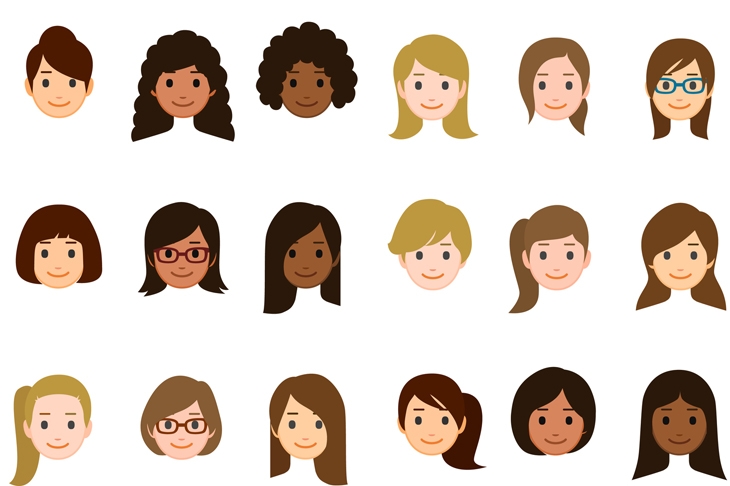Talking to someone in her mid-twenties recently, I mentioned someone else of the same age. ‘She’s a really talented girl,’ I said. Then I checked myself. ‘Sorry… er… woman.’ Sara smiled. ‘It’s OK,’ she replied. ‘That’s what I call myself. I’m a self-identifying “girl”.’
Fair enough. But the exchange stayed with me. It brought back the episode of Have I Got News For You which featured the ‘Michael Fallon touched Julia Hartley–Brewer’s knee’ story. Quentin Letts offered the opinion that Fallon had been brave, on the grounds that Hartley-Brewer is a ‘big strong girl’. ‘She’s not a girl,’ responded the presenter Jo Brand. ‘She’s a woman.’ The line got a laugh, and indeed a round of applause.
Again, fair enough. You can see why, with that audience and against that opponent, that presenter would say what she did. There is indeed something about the word ‘girl’ that sounds demeaning, even though it isn’t meant that way. We need a replacement.
If you’re talking about a man, it’s actually quite rare that you call him a ‘man’. You wouldn’t say ‘Mike’s a great man’ — it’d sound like you were comparing him to Churchill. Instead you say ‘he’s a great bloke’, or ‘guy’. If the man is under 30, say, you might use ‘lad’. (That word took a bit of a hit during the ‘lads’ mags’ era, but its more neutral meaning seems to have survived.) Depending on your age and class you might even refer to a ‘chap’ or ‘feller’.
But when it comes to females, there are only two choices: ‘woman’ and ‘girl’. The former, like ‘man’, is usually too formal, too strait-laced. It gives you the Churchill problem, with Winston replaced by Florence Nightingale. However ‘girl’ has the unfortunate quality of being the word for a female child. You’d never refer to an adult male as a ‘boy’ (with the exception of Corbynites labelling their hero the ‘absolute boy’). So when you call an adult female a ‘girl’, things can get tricky. It sort of works for the under-thirties, as Sara shows. But as Sara also shows, it’s easier if you’re female yourself. As a man using the term, I’ve started to feel uncomfortable. There are of course other words used to refer to adult females, but none are as judgment–free as ‘bloke’ and ‘guy’. For a long time there was ‘lady’, but that always had the same formality problem as ‘woman’, and in any case has recently fallen out of fashion. Certainly in sporting circles — last year the Arsenal Ladies Football Club changed their second word to ‘Women’. The only place you’ll hear the ‘l’ word these days is in golf clubhouses. Which tells you everything you need to know about it.
Then there are the downright patronising words: ‘chick’, ‘bint’, ‘filly’ and so on. ‘Bird’ used to be at the less offensive end of this scale. Explaining his song ‘Blackbird’, which was inspired by the civil rights movement in 1960s America, Paul McCartney says that the ‘bird’ he’s encouraging to fly is a black woman. Of course it works because of the double meaning — the lyrics are ostensibly about an actual blackbird. It’s a very 1960s reference, and no doubt Macca would be at pains to point out that he knows ‘bird’ is less acceptable these days.
Perhaps some women, like Sara, are happy with ‘girl’. Even those who aren’t in their twenties — women of all ages refer to going on a ‘girls’ night out’. And in 2015 a Downing Street photographer shouted ‘Morning, girls’ at Nicky Morgan (then 42) and Amber Rudd (51). The quizzical look he got from Morgan produced an immediate apology. But after a few seconds’ thought, and despite being Minister for Women and Equalities at the time, Morgan called back: ‘Girls? Thank you!’
But I’ve had several conversations like the one with Sara where the ‘g’ word has given me pause for thought. Sensing that it wouldn’t be welcomed, I’ve been forced into using ‘woman’. So what new term could we come up with? One solution might have been to appropriate ‘guy’ and make it unisex. It’s not uncommon for people (usually men, though women do it too) to address a mixed group as ‘guys’. For instance: ‘Hey guys, shall we get some more drinks?’ But it doesn’t work as well in the singular — it’s hard to imagine referring to a woman as a ‘talented guy’. And anyway, Jane Garvey has stamped on the practice full stop. The Woman’s Hour presenter tweeted last year: ‘I’m not a complainer to bar or waiting staff generally — no one wants to be that boring git — but I am not a guy.’
Perhaps we could take inspiration from the Australian ‘Sheila’. Granted, that term itself is outdated, but how about another name that could stand for all females? Maybe ‘Chaka’, on the grounds that Ms Khan claims to be ‘every woman’.
Whatever we choose, a solution has to be found. As far as the existing word is concerned, it’s time to go, girl.
On the Spectator Podcast, Mark Mason discusses the word ‘girl’ with feminist writer Julie Bindel.






Comments